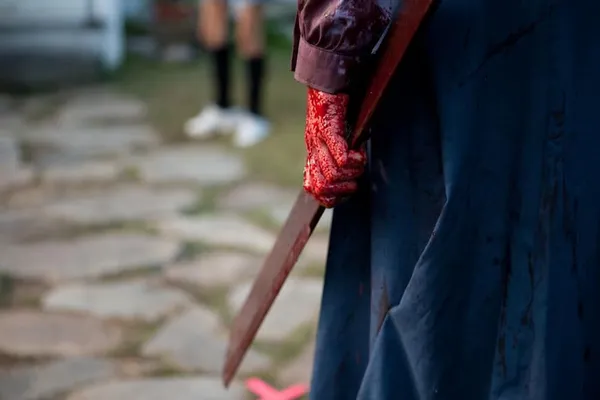Eye For Film >> Movies >> The Woman (2011) Film Review
The Woman
Reviewed by: David Graham

Rising indie director Lucky McKee's latest macabre fairytale is just as concerned with female psychology as his stunning debut May was, but this time he focuses on familial dysfunction and gender politics to put his audience through the emotional wringer. Having caused a serendipitous storm at Sundance that has perhaps misled horror fans into expecting another shock-a-thon in the vein of The Human Centipede or A Serbian Film, The Woman is actually nowhere near as gratuitous or unpleasant as its premise might suggest.
It's actually more akin to harrowing French masterpiece Martyrs; it's every bit as layered and lingering but McKee foregoes Pascal Laugier's deadly serious tone to forge a blackly humorous and hyper-stylised fable that's bound to challenge, delight and distress audiences in equal measure.

A white-collar family man spies a feral female on a hunting trip, and instantly sees her as a prize specimen. Capturing the woman and chaining her up in his underground garden basement, Mr Cleek soon encourages his wife and children to lend a hand with his 'secret project'. He aims to 'help' the woman by 'training' and 'civilising' her, but it soon transpires that Cleek is anything but civilised himself.
His wife Belle has been broken by his dominance, their son Brian is following in his father's destructive footsteps, youngest daughter Darling is unhealthily desensitised to the domestic abuse around her while adolescent daughter Peggy is struggling with the usual growing pains at school as well as her mounting moral panic at home. As the woman's presence brings out the animal in the boys, it comes down to the others to confront their conscience in order to break the cycle before it spins dangerously out of control.
McKee and cult horror scribe Jack Ketchum have carefully crafted a simple parable that highlights uneasy truths about the power balance between men and women, while pushing buttons even jaded genre aficionados might not have believed film-makers could still reach. There's nothing here that you haven't superficially seen before, and the brutality is relatively restrained, but everything about the way Cleek and, progressively, his family interact with each other and especially the woman is calibrated to cause maximum discomfort in the viewer, forcing you to examine the dynamics of each situation and your own reaction to events.
There are precious few moments of typical horror violence - though when they do come they are alarmingly intense - but it's the psychological degradation that cuts the deepest. Scenes of Cleek power-washing the helpless woman, condescendingly dressing her up and asserting his verbal superiority over his family are all horribly upsetting, even more so for how much he obviously believes in the right of what he is doing.
The performances are key to how involving and provocative the film succeeds in being; if one of them didn't work the whole story would probably cave on in itself. Sean Bridgers walks a fine line between misogynist caricature and righteously deluded psychopath, his conviction always ambiguously jostling with his inability to curb his baser instincts. Angela Bettis effectively conveys how tortured Belle must be, having given up on herself long ago but painfully aware of the devastating effect her husband is having on those nearest and dearest to her.
Young Zach Rand's role will make many people especially uncomfortable, as his involvement in his father's experiment becomes ever more pro-active, but it wouldn't be half as horrifying if he didn't play the part with such dead-eyed and uncaring creepiness. Meanwhile, Shyla Molhusen's presence as little Darling makes the film both delightful and disturbing - her wide-eyed innocence is charming but her gleeful complicity is insidiously unsettling.
However, The Woman belongs to the two actresses at its core. Both Pollyanna McIntosh and Lauren Ashley Carter excel as the wild eponymous anti-hero and compassionate teenager Peggy respectively. We experience most of the action through their roles, Carter mirroring our fear, disgust and outrage while McIntosh embodies our anger, pain and desire for vengeance. Carter skilfully and subtly shows Peggy's distress visibly swelling, keeping the audience perched on seat-edge awaiting the moment when she'll hopefully realise she may be the only one with the willpower to do what's right.
McIntosh, in particular, is an absolute revelation - her role could easily have been a one-note cliche, but she manages to be simultaneously defiant and vulnerable, alluring but alarming, terrifying and tender, while being strung up on the spot for most of the duration. Her guttural roaring and garbled articulating are both frightening and fascinatingly authentic-sounding, while her body language communicates how cunning and indomitable her character is. It's an astonishing performance that tantalisingly hints at the mythos that was so sadly squandered with previous Ketchum adaptation The Offspring; she makes you want to watch the film again just to appreciate her every nuance in communicating the woman's physical and emotional state.
The story takes its time in setting up the characters and building menace, before suddenly exploding into unexpected insanity for the deliriously exciting climax. The crowd-pleasing catharsis you'd expect is tempered by the surprising fate dealt to some characters, while the woman's part in proceedings is both awesome to behold and ultimately transcendent.
The Woman will resonate in your head for days, and demands discussion to unravel its intricate web of provocative ideas. As a generous little bonus, if you hang around through the credits you'll be treated to a beautiful animated sequence conveying Darling's dreamworld evocation of the woman's existence.
McKee films everything with an almost sadistically candy-coated glow, the perfect surface represented by the Cleek home and their sun-drenched idyllic surroundings making the sickness spreading underneath seem all the more unsavory. The director often intersperses his narrative with jarring indie songs, their semi-ironic earnestness a stylistic gimmick some will find incongruous, though they do stave off the encroaching nastiness.
He's also fond of slo-mo flourishes, which can come across as corny but are effective in building tension at some points while forcing us to consider situations and the characters' thoughts at others. The story's subtext is occasionally made a little too obvious by the dialogue, but all of these techniques and strategies seem to be deliberate reminders that this is not meant to be reality; it's an allegorical fantasy that aims to hit you on a visceral level first and leave you pondering its implications after, and in both regards it's extremely successful.
Horror film of the year so far, and likely to be one of the most memorable and celebrated of the coming decade, The Woman will hopefully find as wide an audience as possible - and stun them into submission.
Reviewed on: 02 Sep 2011


















